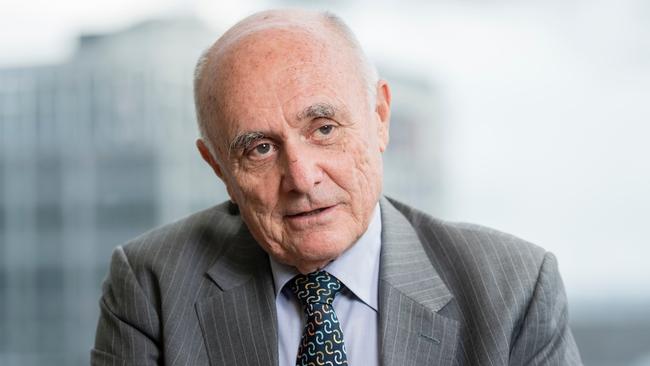Former ACCC boss Alan Fels calls for split of audit and consulting services
Allan Fels has called for a break-up of the audit and consulting industry, saying Australia could lead the world in dealing with conflicts of interest at the heart of the business model.

Former competition boss Allan Fels has called for the break-up of audit and consulting firms, telling parliament Australia could lead the world in dealing with conflicts of interest at the heart of the business model.
Appearing before the Senate finance and public administration committee on Monday, the former Australian Competition and Consumer Commission chairman said the tax scandal hanging over PwC Australia showed the need to split the sector.
“The PwC scandal is, in some respects, a global one but it originated in Australia and the solution can come from Australia,” Professor Fels said.
“PwC has greatly undermined public and business trust in the integrity of audit.”
Professor Fels, who ran the ACCC from its inception in 1995 to 2003, said separating audit and consulting and properly regulating the sector were necessary to stop more poor behaviour.
“The balance of costs and benefits, advantages and disadvantages has clearly changed following the PwC scandal and it is now clear that self-regulation and government oversight don’t work,” he said. Professor Fels said the culture of the consulting sector, and profit incentives, meant that self-regulation would not work. “Self-regulation works particularly badly in many, many instances and there are no signs that it’s working well in related areas of the activities of the big four,” he said.
“On the regulatory side, there are many signs that it is not going to prove to be a solution. So it is better to cut through with a clear separation of the activities.”
Professor Fels said audit and consulting firms should be banned from donating money to political parties, which they were doing to ensure they retained access to government.
“Donations seem to be linked with buying influence. I don’t think the donations reflect any kind of ideological commitment. They are an investment to get a return, and that makes us very worried about them,” he said.
He said legislators ”should come down very hard on the industry, almost too hard at the beginning” rather than letting the response “evolve over time”.
“Non-audit activities have the potential to compromise the conduct of audit,” he said, adding that separating the two would “greatly enhance the reputation of the audit companies”. The inquiry heard that the big four firms, Deloitte, PwC, EY and KPMG, arguing that there were benefits from combining consulting and advisory work in a business that also did audit. “This is a rather dangerous argument for them to run because it seems to admit that there is indeed a connection between consulting and advisory activities and audit – despite their claims that they can be kept separate,” Professor Fels said.
EY had proposed to split its audit and consulting arms in a mammoth deal dubbed “Project Everest”, but this failed after the firm’s US leadership could not agree on how to divide the firm’s profitable tax operations.
Professor Fells said the high salaries of professional services partners, as revealed by PwC’s answers to questions on notice showing many earnt more than $1m a year, made clear the bargaining power of the firms and the lack of competition in the sector.
“That has really risen as governments have made themselves more dependent on big consulting firms when they did not need to do so and when they could have often got a better deal from having a good public service,” he said.
Deloitte chief executive Adam Powick hit back on the claims, saying there was significant competition. “Every single piece of work that we tender for government is a competitive rigorous process against many organisations,” he said.








To join the conversation, please log in. Don't have an account? Register
Join the conversation, you are commenting as Logout